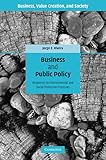Business and public policy : responses to environmental and social protection processes / Jorge E. Rivera.
Material type: TextSeries: Business, value creation, and societyPublication details: Cambridge : Cambridge University Press, 2010Description: xvi, 249 p. : ill. ; 24 cmISBN: 9780521897815 (hbk.); 0521897815 (hbk.)Subject(s): Business | Industries -- Social aspects | Industries -- Environmental aspects | Political planningDDC classification: 658.4/083 LOC classification: HF1008 | .R58 2010Online resources: Contributor biographical information | Publisher description | Table of contents only
TextSeries: Business, value creation, and societyPublication details: Cambridge : Cambridge University Press, 2010Description: xvi, 249 p. : ill. ; 24 cmISBN: 9780521897815 (hbk.); 0521897815 (hbk.)Subject(s): Business | Industries -- Social aspects | Industries -- Environmental aspects | Political planningDDC classification: 658.4/083 LOC classification: HF1008 | .R58 2010Online resources: Contributor biographical information | Publisher description | Table of contents only | Item type | Current library | Collection | Call number | Copy number | Status | Date due | Barcode |
|---|---|---|---|---|---|---|---|
 Book
Book
|
University of Macedonia Library Βιβλιοστάσιο Α (Stack Room A) | Main Collection | HF1008.R58 2010 (Browse shelf (Opens below)) | 1 | Available | 0013135599 |
Introduction -- Business responses to the protective policy process in the US -- Country context and the protective policy process-business response relationship -- Firm level characteristics and business responses to environmental/social protection demands -- Is greener whiter? Resistance strategies by the US ski industry -- Is greener whiter yet? Resistance or beyond-compliance by the US ski industry? -- Institutional pressures and proactive environmental protection: evidence from the Costa Rican hotel industry -- Chief executive officers and proactive environmental protection : evidence from the Costa Rican hotel industry -- Certified beyond-compliance and competitive advantage in developing countries -- Conclusion.
It is increasingly common for businesses to face public policies and government regulation that demand some form of environmental or social protection. These protective public policies have grown in number, complexity, and stringency over the last few decades, not only in industrialized countries but also in the developing world. In this book, Jorge Rivera presents a new theoretical framework for understanding the relationship between protective public policies and business compliance. This framework explains different levels of business compliance in terms of three different factors: the link between the stages of protective public policies and different levels of business resistance, the effect of country context, and the effect of firm-level characteristics. The second part of the book supports and elaborates on this framework by presenting empirical studies that examine two voluntary environmental programs: the US ski industry's Sustainable Slopes Program and the Certification for Sustainable Tourism in Costa Rica.
Includes bibliographical references and index.





There are no comments on this title.